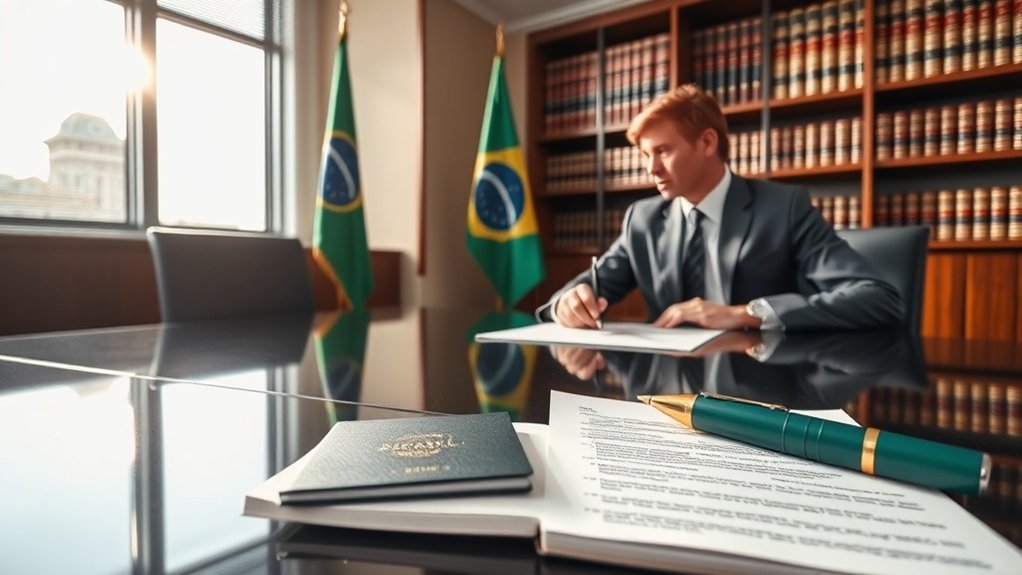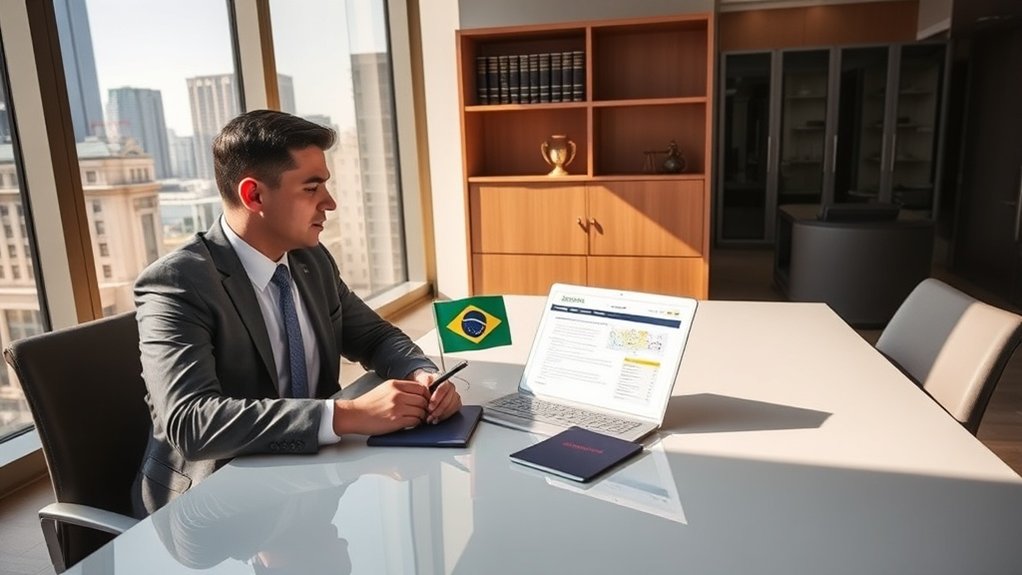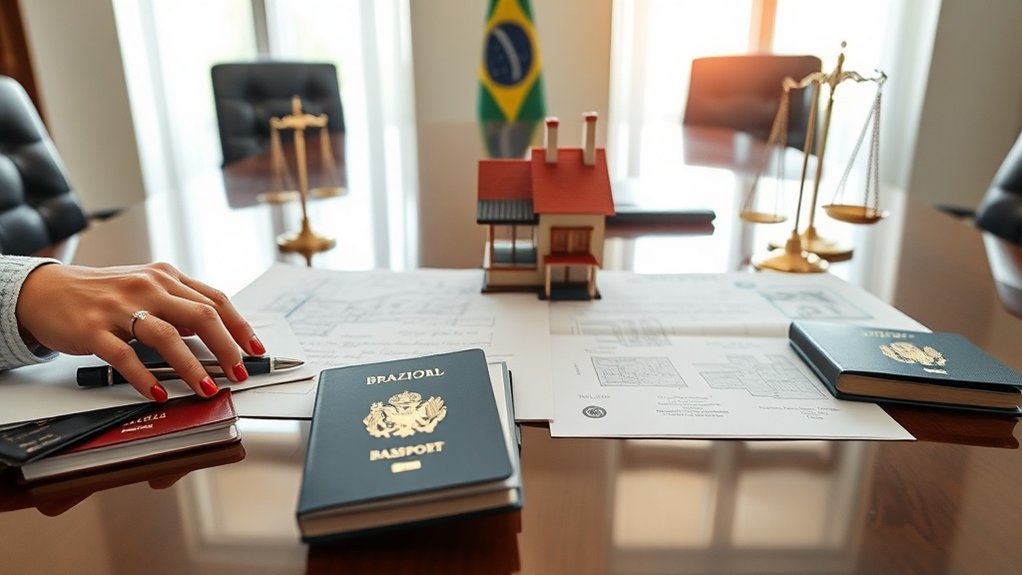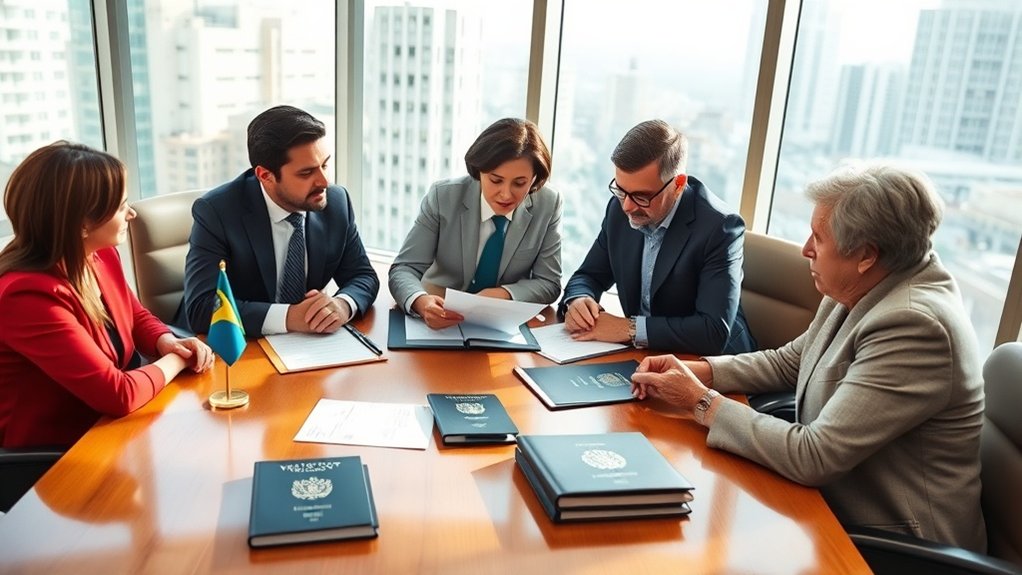If you hold dual nationality and have ties to Brazil, you know how quickly legal questions can get complicated. From consular paperwork to property rights, conflicting obligations can catch you off guard. Vieira Braga Attorneys focus on helping people like you understand these overlapping rules and protect your interests. Wondering how recent changes in Brazilian laws could affect your status—or what steps you should take next? There are some crucial points you shouldn’t overlook.
Understanding Dual-Nationality in the Brazilian Legal Context

While many countries place restrictions on dual citizenship, Brazil adopts a more flexible approach in its legal framework. If you acquire another nationality, Brazilian law generally allows you to retain your Brazilian citizenship, unless you formally request renunciation. The Brazilian Constitution recognizes dual nationality, provided your other citizenship is acquired either by birth or by a naturalization process that doesn’t require you to renounce your original nationality. This means you can usually hold a Brazilian passport and another country’s passport at the same time.
You’ll find that, under Brazilian law, you’re considered Brazilian regardless of your other citizenships when you’re in Brazil. This can affect your legal obligations, such as taxes or military service, but Brazil doesn’t penalize you for having more than one nationality. To exercise your rights fully, it’s useful to keep your Brazilian documents current, especially if you plan to travel or live abroad as a dual national. Engaging with specialized legal support can further ensure that your dual-nationality status is properly recognized and that you comply with all relevant Brazilian laws.
Common Legal Conflicts Faced by Dual Citizens
Because holding two passports can open doors to new opportunities, it can also create unexpected legal complications for dual citizens. You might face conflicting laws between Brazil and your other country of citizenship, which can create confusion over taxation, military service, or inheritance rights. For example, both countries may claim you owe taxes on the same income, or require you to fulfill mandatory military obligations. Dual citizens often encounter difficulties with property ownership, as some nations restrict or scrutinize foreigners’ rights to own or transfer assets.
You could also run into trouble if both countries require you to enter or exit using their respective passports, leading to questions about your legal status or even fines. Issues may arise if you’re accused of a crime abroad, as each country may assert jurisdiction. Parental rights and child custody disputes can become especially complex, since different countries may have conflicting approaches to family law. For these reasons, professional guidance from experienced immigration lawyers is essential to reduce the risk of errors and ensure compliance with varying international and Brazilian regulations.

Even when you’re far from home, Brazil’s consular rules still apply and can affect many aspects of your life abroad. If you hold dual nationality, you’ll need to pay special attention to the expectations and obligations set by Brazilian consulates. These rules can influence your ability to travel, access government services, and even comply with legal requirements in both countries. To stay on the right side of the law, you should:
- Register with the nearest Brazilian consulate: This keeps your information current and ensures you receive critical updates or assistance.
- Stay informed about consular procedures: Rules regarding voting, military service, and other civic duties continue to apply even outside Brazil.
- Understand your rights and responsibilities: Consular staff can guide you, but it’s your responsibility to be proactive about compliance.
Ignoring these requirements could complicate your status or access to essential services. For those navigating complex issues like regularizing your immigration or maintaining dual nationality, professional legal guidance can help ensure you remain compliant with both Brazilian and foreign regulations.
Documentation Challenges and Solutions
Staying compliant with Brazilian consular rules often leads to questions about which documents you need and how to keep them in order. You’ll likely face requests for birth certificates, marriage records, proof of residence, and sometimes translations or apostilles. If you’ve got dual nationality, you’ll have to show documents from both countries, which can quickly get confusing. It’s easy to miss a requirement, especially when documents must be recent, officially certified, or legalized.
To avoid setbacks, create a checklist of needed documents before any consular appointment. Always check the latest consulate guidelines, since requirements can change without much notice. If you’re unsure, reach out to the consulate directly or consult a legal professional. Keep digital and physical copies of everything, and store originals securely. Don’t wait until the last minute—processing times vary, and missing paperwork could delay urgent travel, renewals, or official registrations. Stay proactive and organized to streamline the process. For dual nationals dealing with both Brazilian and foreign documents, obtaining personalized case analysis from an immigration lawyer can help prevent errors and ensure compliance with Brazilian regulations.
Inheritance and Property Rights for Dual Nationals

When you have Brazilian citizenship along with another nationality, navigating inheritance and property rights can get complicated. You’ll need to understand how Brazilian law interacts with the rules of your other country of citizenship. Brazil typically applies its own civil code to assets located within the country, regardless of your foreign ties. That means if you inherit property in Brazil, local rules govern succession, even if you live abroad.
Here’s what you should consider:
- Applicable Law: Brazilian courts usually apply Brazilian law to property located in Brazil, especially real estate, regardless of your other citizenship.
- Heir Rights: Brazilian law protects certain heirs, like children and spouses, guaranteeing them a minimum share (“legítima”) of the estate, which differs from many countries.
- Tax Implications: You may face taxation both in Brazil and your other country. Understanding double taxation treaties or relief options is essential to avoid unexpected liabilities.
Seeking specialized legal assistance can help dual nationals prevent legal conflicts and ensure compliance with both Brazilian and foreign regulations.
Careful planning prevents costly mistakes.
Managing Conflicting Legal Obligations
When you hold dual citizenship, you’ll need to keep track of both countries’ laws and understand when consular notification is required. It’s easy to face situations where legal obligations clash, especially if both countries assert jurisdiction over the same issue. You’ll have to know your rights and be ready to resolve disputes that can arise from these overlapping demands. Seeking specialized legal support can help you navigate these conflicts, prevent procedural errors, and ensure compliance with both countries’ requirements.
Although dual citizenship offers valuable opportunities, it also brings complex legal challenges. As a dual national, you must navigate overlapping and sometimes conflicting laws from each country. You can’t assume that rights and obligations in one country will automatically apply in the other. Instead, you need to stay informed and proactive to avoid legal pitfalls. Here are three crucial steps you should take:
- Understand Each Country’s Laws: Research the specific rights, duties, and restrictions imposed by both Brazil and your other country of citizenship.
- Monitor Legal Changes: Citizenship laws can change unexpectedly. Stay updated so you don’t accidentally violate new rules.
- Consult Legal Experts: Dual-nationality conflicts often require specialized advice. Seek guidance from professionals familiar with both legal systems.
For the best protection and to ensure legal security at every stage, consulting with experienced immigration lawyers is highly recommended.
Consular Notification Requirements
Because dual nationals often juggle obligations to more than one country, understanding consular notification requirements is essential to avoid legal trouble. If you’re arrested or detained abroad, authorities may need to inform your consulate, but requirements vary by country. Brazil expects its citizens, even those with dual nationality, to notify the nearest Brazilian consulate if they face legal issues overseas. Some countries might not automatically contact your consulate unless you request it, putting the responsibility on you. Failing to follow these notification protocols could limit your access to consular support, such as legal assistance or communication with family. Always check both Brazilian and local regulations to determine your rights and obligations. This careful approach ensures you’re protected under both countries’ legal frameworks. In these situations, legal guidance to avoid severe repercussions can be crucial, as mistakes in following notification requirements or understanding local law could lead to increased risks of sanctions or the loss of important rights.
Resolving Jurisdictional Disputes
While understanding consular notification is important, dual nationals often face more complex issues when the laws of two countries demand conflicting actions. You might find yourself in a situation where Brazil expects one course of action while your other country of citizenship requires something different. To resolve these jurisdictional disputes, you’ll need to carefully assess your obligations and rights. Start by identifying which country’s laws take precedence in your specific case. Then, consider the risks and benefits of complying with one set of rules over the other.
Here’s how you can manage these conflicts:
- Consult legal counsel specializing in international and dual-nationality law.
- Communicate transparently with both countries’ consular authorities about your situation.
- Document every step you take to demonstrate good faith and compliance with both legal systems.
Consulting with professionals who understand the complexity of U.S. immigration laws can help ensure you make informed decisions and avoid costly legal missteps.
The Impact of Recent Changes in Brazilian Nationality Laws
As Brazil updates its nationality laws, the changes directly affect dual nationals and anyone considering acquiring foreign citizenship. You’ll notice that recent reforms clarify when Brazilians may lose or retain their citizenship after obtaining another nationality. Previously, acquiring a foreign citizenship could mean automatic loss of Brazilian nationality, unless you met specific exceptions. Now, the law’s more flexible—loss is no longer automatic. Instead, you must formally request to renounce your Brazilian citizenship, giving you greater control over your status.
These updates also affect children born abroad to Brazilian parents. If you’re living outside Brazil, it’s easier for your child to claim Brazilian citizenship, provided you meet certain registration requirements. The reforms address the growing reality of global mobility, making it simpler to navigate dual-nationality issues. However, you must still comply with specific consular rules and stay informed about the latest legal developments to protect your rights and status. Having expert guidance from immigration lawyers in Brazil can help you avoid common documentation errors and ensure your family’s legal security during these transitions.
How Vieira Braga Attorneys Support Dual-Nationality Clients

If you’re facing challenges with dual-nationality status, Vieira Braga Attorneys guide you through Brazil’s legal complexities. They’ll help you gather and prepare the right consular documents for your situation. With their support, you can address bureaucratic hurdles more confidently and efficiently.
Because dual-nationality often triggers overlapping legal obligations, navigating this terrain can quickly become overwhelming. You might face conflicting requirements from different countries, which can put your rights and responsibilities at risk. Vieira Braga Advogados helps you make sense of these complexities by providing targeted legal guidance. Their attorneys analyze your specific situation and clarify which laws apply to you and when. This expertise is especially valuable when you’re confronted with:
- Conflicting tax obligations between Brazil and another country
- Dual-military service requirements or exemptions
- Legal recognition of civil status, such as marriage or divorce
Consular Documentation Assistance
When you need to manage consular documentation as a dual-national, even simple paperwork can quickly become complicated. Conflicting regulations, language barriers, and unfamiliar requirements often delay essential processes like passport renewals, birth registrations, or power of attorney filings. Vieira Braga Advogados steps in to streamline these tasks for you. They’ll review your situation, explain specific Brazilian consular rules, and guide you through required steps, ensuring every form and supporting document meets consulate standards.
You won’t have to worry about missing documents or misunderstandings. The firm communicates with consular officials, translates documents when necessary, and schedules appointments on your behalf. Vieira Braga attorneys anticipate common pitfalls and provide practical solutions, so you can resolve consular matters efficiently and focus on your priorities.
Steps to Protect Your Rights Across Borders
Although navigating the complexities of dual nationality can seem daunting, taking clear steps helps ensure your rights remain protected across borders. You need to be proactive with your legal status and documentation in each country where you hold citizenship. Failing to recognize the nuances of local laws can expose you to unexpected legal or administrative issues. To avoid complications, follow these essential actions:
- Keep Documentation Updated: Always maintain valid passports and identification for both nationalities, and renew them before expiry to avoid travel or legal barriers.
- Understand Local Laws: Research and stay informed about the legal obligations and rights in each country, including tax, military service, and residency requirements.
- Seek Professional Guidance: Consult with experienced legal professionals, like Vieira Braga Advogados, who specialize in cross-border issues and dual-nationality conflicts.
Frequently Asked Questions
How Long Does It Take to Resolve Dual-Nationality Legal Disputes?
Resolving dual-nationality legal disputes can take anywhere from a few months to several years, depending on the complexity of your case and the cooperation between involved countries. You’ll need to gather all relevant documentation and respond promptly to legal requests. If both countries’ authorities communicate efficiently and your situation is straightforward, you might see a faster resolution. However, if disagreements arise, you should prepare for a lengthier process. Stay proactive and informed throughout.
Are Vieira Braga Advogados Services Available in Languages Besides Portuguese?
Yes, you can access services in languages besides Portuguese. When you reach out, make sure to specify your preferred language, as they often accommodate clients in English and sometimes Spanish. This flexibility helps you communicate more easily and ensures you understand every step of your legal process. Don’t hesitate to ask about language options when you first contact them—it’s a common request, and they’re usually prepared to support international clients.
What Are the Average Legal Fees for Dual-Nationality Cases?
You’ll find that legal fees for dual-nationality cases can vary widely, typically ranging from $1,500 to $5,000, depending on the complexity of your situation and the services you need. Some lawyers might charge hourly rates, while others offer flat fees for specific tasks. It’s smart to ask for a detailed estimate and clarify what’s included upfront, so you won’t face unexpected costs as your case progresses.
Can Vieira Braga Advogados Assist With Travel Visa Issues?
Yes, you can get help with travel visa issues. When you’re facing complicated visa requirements, you’ll need someone who understands the paperwork, deadlines, and legal nuances. You shouldn’t try to navigate embassy procedures or immigration rules alone, as a small mistake can lead to delays or denials. Reach out for guidance, so you can focus on your travel plans instead of worrying about unexpected hurdles along the way.
Does the Firm Provide Emergency Legal Assistance Abroad?
Yes, you can count on the firm to provide emergency legal assistance while you’re abroad. If you face urgent legal issues—like detention, sudden travel restrictions, or family law emergencies—they’ll help you navigate local laws and coordinate with consular authorities. You won’t be left to handle complex situations alone; they’ll act quickly to offer guidance, represent your interests, and work to resolve your legal challenges as efficiently as possible.
Conclusion
If you’re facing the complexities of dual nationality and Brazilian consular rules, Vieira Braga Attorneys can guide you every step of the way. They’ll help you navigate legal conflicts, gather the right documents, and ensure you stay compliant with both Brazilian and foreign laws. With their expertise, you can protect your rights and avoid costly mistakes. Don’t let overlapping obligations overwhelm you—reach out to Vieira Braga Attorneys and secure peace of mind across borders.
